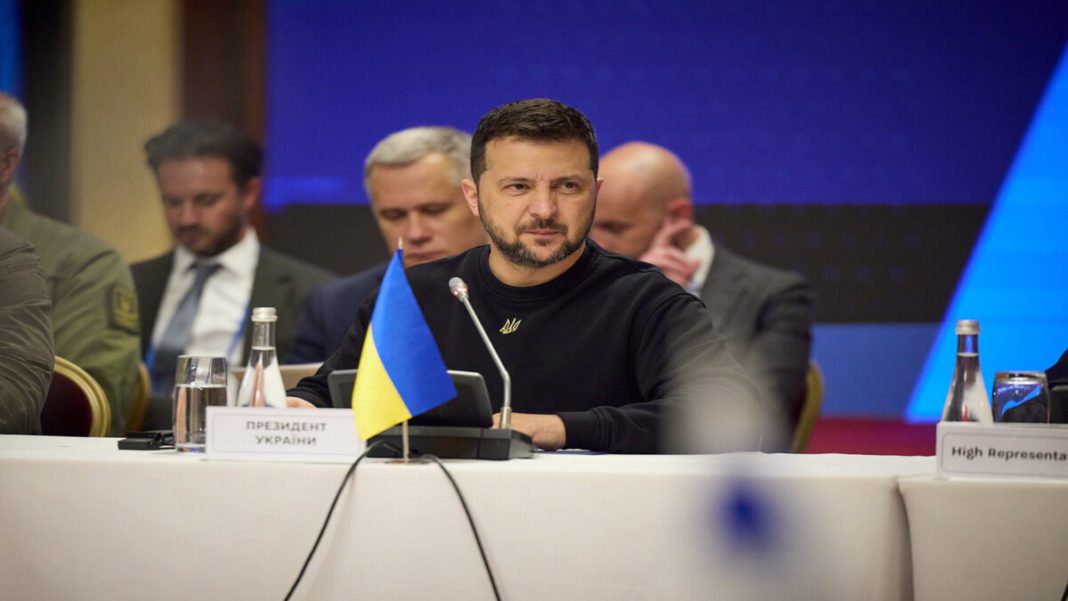UKRAINE: Ukraine is currently engaged in multiple fronts against Russia, facing significant challenges on the battlefield as well as diplomatic gains. Since Russia’s invasion last year, Western backing for Kyiv has generally remained steadfast. However, there are emerging divisions within the pro-Ukraine alliance.
The United States has been Ukraine’s primary supporter, offering over $110 billion in military and economic aid. However, recently, Congress abandoned plans to provide an additional $6 billion to the nation due to internal disputes over funding the federal government.
Some Republicans believe support for Ukraine should be limited, while others insist it should be contingent on increased spending for US border security.
President Joe Biden has pledged an additional $24 billion in aid to Ukraine, but this commitment may now be influenced by domestic political dynamics in the United States. On the other side of the Atlantic, Kyiv is facing the potential loss of another ally.
In Slovakia, recent elections resulted in Robert Fico’s Smer party winning the most seats, though he still needs to form a coalition. Fico, a populist former prime minister, is widely perceived as pro-Moscow and unsupportive of Kyiv, as he campaigned on a promise to end military assistance to Ukraine.
“People in Slovakia have bigger problems than Ukraine,” he said. That means, along with Viktor Orban’s Hungary, there are now two EU nations ready to veto further collective EU actions in support of Ukraine.
Meanwhile, neighbouring Poland is approaching elections, and there have been doubts expressed about their support for Ukraine. The ruling Law and Justice Party has pledged to halt the import of low-cost Ukrainian grain, a move opposed by Polish farmers.
President Andrzej Duda has characterised Ukraine as a drowning man dragging down his rescuers. Prime Minister Mateusz Morawiecki initially stated that Poland was “no longer transferring any weapons to Ukraine”, though this decision was later reversed.
Electoral politics are starting to impact the Volodymyr Zelenskyy-led nation’s support, alongside other pressing global issues such as the cost-of-living crisis and the climate emergency. During the recent United Nations General Assembly, it became evident that Ukraine was no longer automatically the top priority on the agenda.
President Volodymyr Zelensky’s in-person addresses to the UN Assembly and the Security Council didn’t garner the same level of attention as in the past. Diplomats observed that the Ukrainian delegation’s prominence had diminished as leaders from the Global South pursued their own agendas.
The situation is what Kremlin strategists have long hoped for. Diplomats believe Vladimir Putin aims to wait out the Western nations, sustaining the conflict until Ukraine starts to lose international backing and seeks a political resolution.
Nevertheless, Western leaders assert their commitment to enduring the challenges and exhibit greater strategic patience than Russia anticipates.
It’s not for nothing that this past weekend, UK Foreign Secretary James Cleverly acknowledged that global war fatigue was “putting pressure on countries all over the world” and called it a “big thing” and “something we have got to deal with” in House Magazine.
His counterargument was that pressures, both political and economic, would only worsen if Western backing for Ukraine declined. “This is tough, and this is painful. But it will only be more tough and more painful if we falter.”
EU foreign ministers travelled to Kyiv on Monday to refute that perception, holding their first-ever meeting there as a show of solidarity.
The head of EU foreign policy, Josep Borrell, told the media that the EU would continue to support its armed forces, which are currently valued at over €5 billion (£4.3 billion).
“One thing is clear: for us Europeans, the war of Russia against Ukraine is an existential threat, and we have to react according to that,” he stated. However, he acknowledged that Congress’s choice to obstruct additional aid “worried” him.
Diplomats are countering this by pointing out that the conflict’s implications reach far beyond Ukraine’s borders. They argue that countries in Africa, Asia, and Latin America are gradually becoming more receptive to this perspective.
Previously, some of these nations regarded the conflict as a regional European issue with little relevance to them. However, Russia’s withdrawal from the Black Sea grain initiative and its attacks on Ukrainian grain silos have made it easier for Ukraine and Western nations to assert that the Global South has a vested interest in the outcome of the war.
Dmytro Kuleba, Ukrainian Foreign Minister, said, “What is at stake in Ukraine is much bigger than just Ukraine. It’s about the stability and predictability of the world.”
So, the Volodymyr Zelenskyy-led nation is engaging in a lengthy game. Leading government officials have long expected Western support to wane over time. The whims of transatlantic election cycles have not deterred them.
They know that the true challenge to Western unity may arise in two critical scenarios. First, if Donald Trump is re-elected as president and reduces US support, Ukraine will need to make a significant decision about the duration of its continued fighting.
Secondly, in the event of a conflict resolution, allies may struggle to come together to agree on the necessary compromises for a political settlement.
Also Read: Republicans Clash in Debate as Trump Remains Absent from Frontrunner Position



